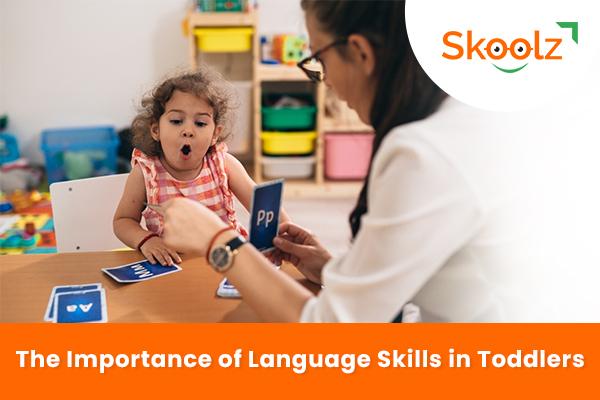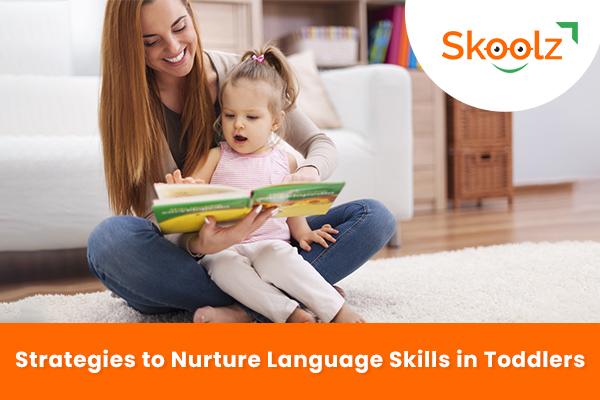
Unlocking the World of Words: Fostering Language Skills in Toddlers
Unlocking the World of Words: Fostering Language Skills in Toddlers
Language skills are crucial for toddlers as they begin to explore and understand the world around them. The acquisition of language opens doors to communication, self-expression, and cognitive development. In this blog, we will delve into the importance of language skills in toddlers, explore the key components of language development, and provide practical strategies to nurture and enhance language skills during this critical stage of growth.
Language skills are crucial for toddlers as they develop their ability to communicate, understand others, and express themselves. Here are some language skills that toddlers typically develop during their early years:
1. Vocabulary Expansion:
Toddlers gradually increase their vocabulary and learn new words every day. They start with simple words and progress to more complex ones. Engage in conversations, read books, and name objects in their environment to help expand their vocabulary.
2. Understanding Instructions:
Toddlers begin to understand simple instructions and follow them. They can comprehend and respond to requests such as "Bring me the toy" or "Put the book on the shelf."
3. Expressive Language:
Toddlers start using words and gestures to express their needs, wants, and feelings. Initially, they may rely on single words, but as their language skills progress, they begin to form two- or three-word phrases.
4. Sentence Formation:
As toddlers grow, they start combining words to form simple sentences. They begin to grasp basic grammar rules, such as using articles (a, an, the) and plurals (adding -s or -es).
5. Questions and Answers:
Toddlers develop the ability to ask simple questions using question words like "what," "where," and "why." They can also respond to questions by providing relevant information.
6. Storytelling and Retelling:
Toddlers enjoy listening to stories and may attempt to retell them in their own words. They use their imagination and memory to recount events, creating simple narratives.
7. Turn-Taking and Conversation Skills:
Toddlers learn the importance of taking turns during conversations. They start to engage in back-and-forth exchanges, listening to others and responding appropriately.
8. Pronunciation and Articulation:
Toddlers continue to refine their speech sounds and pronunciation. They may still have difficulty with certain sounds, but their clarity improves as they practice and imitate others.
9. Pre-literacy Skills:
Toddlers develop pre-literacy skills, such as recognizing letters and associating them with their corresponding sounds. They may show interest in books, attempt to trace letters and enjoy rhyming activities.
10. Understanding Non-Verbal Communication:
Toddlers learn to interpret non-verbal cues, such as facial expressions, gestures, and body language. They become more attuned to social cues and emotions.
Encourage language development in toddlers by engaging in conversations, reading books together, singing songs, and playing language-rich games. Provide a supportive and nurturing environment where they feel comfortable expressing themselves. Remember that each child develops at their own pace, so it's essential to be patient and provide plenty of opportunities for language exploration and growth.
The Importance of Language Skills in Toddlers:

Language skills serve as the foundation for a toddler's social development, emotional development, and cognitive development. Here are some reasons why language skills are significant:
1. Communication:
Language skills enable toddlers to express their thoughts, needs, and emotions. Effective communication helps them interact with others, build relationships, and participate in social activities.
2. Cognitive Development:
Language skills play a vital role in cognitive development. As toddlers engage in conversations, listen to stories, and engage in language-based activities, their vocabulary, memory, and problem-solving abilities are enhanced.
3. Literacy Skills:
Early language skills pave the way for future literacy development. Toddlers who have a strong foundation in language skills are more likely to become confident readers and writers as they grow older.
4. Social Interaction:
Language skills facilitate social interaction, allowing toddlers to engage in conversations, take turns, and share ideas. Language provides a means for collaboration, empathy, and understanding among peers and caregivers. 5. Self-Expression and Emotional Regulation: Language skills empower toddlers to express their thoughts, feelings, and needs. This ability to articulate emotions helps them regulate their emotions, fostering emotional intelligence and self-awareness.
Strategies to Nurture Language Skills in Toddlers:

Here are some practical strategies to support the development of language skills in toddlers:
1. Talk, Talk, Talk:
Engage in conversations with your toddler throughout the day. Describe what you are doing, ask open-ended questions, and listen attentively to their responses. This helps expand their vocabulary and encourages language development.
2. Read Together:
Make reading a daily ritual. Choose age-appropriate books with colorful illustrations and engaging stories. Encourage your toddler to participate by pointing at pictures, repeating words, or asking questions.
3. Sing and Rhyme:
Incorporate songs, nursery rhymes, and fingerplays into your daily routine. These activities promote language development, rhythm, and phonological awareness.
4. Expand Vocabulary:
Introduce new words to your toddler's vocabulary. Label objects, describe their characteristics, and provide simple explanations. Encourage them to repeat new words and reinforce their use in context.
5. Encourage Pretend Play:
Encourage your toddler to engage in pretend play, which promotes language development and creativity. Role-play scenarios allow them to use words, develop narratives, and engage in imaginative conversations.
6. Provide Language-Rich Environment:
Surround your toddler with a language-rich environment. Use age-appropriate books, educational toys, and interactive games that encourage language exploration and development.
7. Limit Screen Time:
Limit the exposure to screens and prioritize interactive, face-to-face communication. While some educational apps and programs can be beneficial, meaningful interactions with caregivers and peers are essential for language development.
8. Utilize Everyday Experiences:
Use daily activities as opportunities to build language skills. Talk about the steps involved in tasks like cooking, dressing, or going on outings. Encourage your toddler to describe their experiences and engage in conversation.
Conclusion:
Nurturing language skills in toddlers is a transformative journey that sets the stage for lifelong communication and cognitive development. By creating a language-rich environment, engaging in conversations, and providing ample opportunities for reading, singing, and imaginative play, parents and caregivers can support and enhance their toddler's language skills. Embrace the joy of watching their language abilities grow as they unlock the world of words, expressing themselves and connecting with others in meaningful ways.
If you're interested in learning more about toddlers, look at this article on Developmental Skills for Toddlers and How to Foster Them.
Disclaimer:
The information provided in the blogs is intended to offer general guidance on various aspects of toddler development. However, it is essential to note that every child is unique, and individual circumstances may vary. The content in our blogs should not be considered a substitute for professional medical advice. If you observe any critical symptoms or have specific concerns about your child's health, we strongly advise consulting with a qualified pediatrician. We do not assume any responsibility or liability for actions taken based on the information provided. Always seek the expertise of a medical professional for any specific concerns or medical attention your child may require. By accessing our toddler blogs, you acknowledge the importance of consulting with a pediatrician for any critical symptoms or concerns.
 Written by:
Written by:
Swati Sahu
Digital Marketer

Unlocking the World of Words: Fostering Language Skills in Toddlers
Language skills are crucial for toddlers as they begin to explore and understand the world around them. The acquisition of language opens doors to communication, self-expression, and cognitive development. In this blog, we will delve into the importance of language skills in toddlers, explore the key components of language development, and provide practical strategies to nurture and enhance language skills during this critical stage of growth.
Language skills are crucial for toddlers as they develop their ability to communicate, understand others, and express themselves. Here are some language skills that toddlers typically develop during their early years:
1. Vocabulary Expansion:
Toddlers gradually increase their vocabulary and learn new words every day. They start with simple words and progress to more complex ones. Engage in conversations, read books, and name objects in their environment to help expand their vocabulary.
2. Understanding Instructions:
Toddlers begin to understand simple instructions and follow them. They can comprehend and respond to requests such as "Bring me the toy" or "Put the book on the shelf."
3. Expressive Language:
Toddlers start using words and gestures to express their needs, wants, and feelings. Initially, they may rely on single words, but as their language skills progress, they begin to form two- or three-word phrases.
4. Sentence Formation:
As toddlers grow, they start combining words to form simple sentences. They begin to grasp basic grammar rules, such as using articles (a, an, the) and plurals (adding -s or -es).
5. Questions and Answers:
Toddlers develop the ability to ask simple questions using question words like "what," "where," and "why." They can also respond to questions by providing relevant information.
6. Storytelling and Retelling:
Toddlers enjoy listening to stories and may attempt to retell them in their own words. They use their imagination and memory to recount events, creating simple narratives.
7. Turn-Taking and Conversation Skills:
Toddlers learn the importance of taking turns during conversations. They start to engage in back-and-forth exchanges, listening to others and responding appropriately.
8. Pronunciation and Articulation:
Toddlers continue to refine their speech sounds and pronunciation. They may still have difficulty with certain sounds, but their clarity improves as they practice and imitate others.
9. Pre-literacy Skills:
Toddlers develop pre-literacy skills, such as recognizing letters and associating them with their corresponding sounds. They may show interest in books, attempt to trace letters and enjoy rhyming activities.
10. Understanding Non-Verbal Communication:
Toddlers learn to interpret non-verbal cues, such as facial expressions, gestures, and body language. They become more attuned to social cues and emotions.
Encourage language development in toddlers by engaging in conversations, reading books together, singing songs, and playing language-rich games. Provide a supportive and nurturing environment where they feel comfortable expressing themselves. Remember that each child develops at their own pace, so it's essential to be patient and provide plenty of opportunities for language exploration and growth.
The Importance of Language Skills in Toddlers:

Language skills serve as the foundation for a toddler's social development, emotional development, and cognitive development. Here are some reasons why language skills are significant:
1. Communication:
Language skills enable toddlers to express their thoughts, needs, and emotions. Effective communication helps them interact with others, build relationships, and participate in social activities.
2. Cognitive Development:
Language skills play a vital role in cognitive development. As toddlers engage in conversations, listen to stories, and engage in language-based activities, their vocabulary, memory, and problem-solving abilities are enhanced.
3. Literacy Skills:
Early language skills pave the way for future literacy development. Toddlers who have a strong foundation in language skills are more likely to become confident readers and writers as they grow older.
4. Social Interaction:
Language skills facilitate social interaction, allowing toddlers to engage in conversations, take turns, and share ideas. Language provides a means for collaboration, empathy, and understanding among peers and caregivers. 5. Self-Expression and Emotional Regulation: Language skills empower toddlers to express their thoughts, feelings, and needs. This ability to articulate emotions helps them regulate their emotions, fostering emotional intelligence and self-awareness.
Strategies to Nurture Language Skills in Toddlers:

Here are some practical strategies to support the development of language skills in toddlers:
1. Talk, Talk, Talk:
Engage in conversations with your toddler throughout the day. Describe what you are doing, ask open-ended questions, and listen attentively to their responses. This helps expand their vocabulary and encourages language development.
2. Read Together:
Make reading a daily ritual. Choose age-appropriate books with colorful illustrations and engaging stories. Encourage your toddler to participate by pointing at pictures, repeating words, or asking questions.
3. Sing and Rhyme:
Incorporate songs, nursery rhymes, and fingerplays into your daily routine. These activities promote language development, rhythm, and phonological awareness.
4. Expand Vocabulary:
Introduce new words to your toddler's vocabulary. Label objects, describe their characteristics, and provide simple explanations. Encourage them to repeat new words and reinforce their use in context.
5. Encourage Pretend Play:
Encourage your toddler to engage in pretend play, which promotes language development and creativity. Role-play scenarios allow them to use words, develop narratives, and engage in imaginative conversations.
6. Provide Language-Rich Environment:
Surround your toddler with a language-rich environment. Use age-appropriate books, educational toys, and interactive games that encourage language exploration and development.
7. Limit Screen Time:
Limit the exposure to screens and prioritize interactive, face-to-face communication. While some educational apps and programs can be beneficial, meaningful interactions with caregivers and peers are essential for language development.
8. Utilize Everyday Experiences:
Use daily activities as opportunities to build language skills. Talk about the steps involved in tasks like cooking, dressing, or going on outings. Encourage your toddler to describe their experiences and engage in conversation.
Conclusion:
Nurturing language skills in toddlers is a transformative journey that sets the stage for lifelong communication and cognitive development. By creating a language-rich environment, engaging in conversations, and providing ample opportunities for reading, singing, and imaginative play, parents and caregivers can support and enhance their toddler's language skills. Embrace the joy of watching their language abilities grow as they unlock the world of words, expressing themselves and connecting with others in meaningful ways.
If you're interested in learning more about toddlers, look at this article on Developmental Skills for Toddlers and How to Foster Them.
Disclaimer:
The information provided in the blogs is intended to offer general guidance on various aspects of toddler development. However, it is essential to note that every child is unique, and individual circumstances may vary. The content in our blogs should not be considered a substitute for professional medical advice. If you observe any critical symptoms or have specific concerns about your child's health, we strongly advise consulting with a qualified pediatrician. We do not assume any responsibility or liability for actions taken based on the information provided. Always seek the expertise of a medical professional for any specific concerns or medical attention your child may require. By accessing our toddler blogs, you acknowledge the importance of consulting with a pediatrician for any critical symptoms or concerns.
 Written by:
Written by:
Swati Sahu
Digital Marketer




